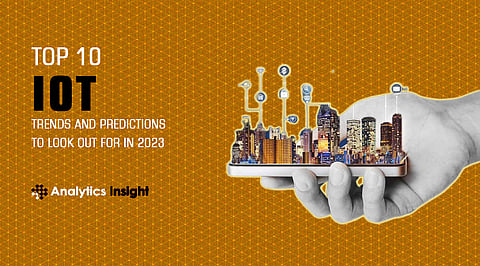

The Internet of Things (IoT) describes the network of physical objects things that are embedded with sensors, software, and other technologies to connect and exchange data with other devices and systems over the internet. IoT's ability to enable devices and equipment to communicate will impact lives. The IoT will continue to deliver new opportunities for digital business innovation for the next decade, many of which will be enabled by new or improved technologies. Take a look at the following IoT trends and predictions that are happening now.
Solutions for Sustainable Energy: Renewable energy was the only energy source that saw increasing consumption throughout the epidemic. Breakthroughs in sustainable energy solutions, when combined with the improved practicality of energy sources like liquid hydrogen, and biofuels, are sure to have far-reaching environmental consequences.
Artificial Intelligence: Data is the fuel that powers the Internet of Things and the organization's ability to derive meaning from it will define its long-term success. AI will be applied to a wide range of IoT information, including video, still images, speech, network traffic activity, and sensor data. It will be possible to achieve good results with AI in a wide range of IoT situations.
Healthcare Spearheads IoT Adoption: The healthcare industry has been tinkering with Internet of Things technology for years now. IoT will make smart buildings out of healthcare facilities, drive revenue, and help healthcare providers save on costs. IoT adoption has become even more crucial to the healthcare industry during the pandemic.
Infonomics and Data Broking: IoT projects showed that 35 percent of respondents were selling or planning to sell data collected by their products and services. By 2023, the buying and selling of IoT data will become an essential part of many IoT systems.
The Emergence of Smart Cities: IoT adoption will result in the establishment of smart cities. Smart cities do not only focus on making life comfortable for people. These cities improve the social, environmental, and financial aspects of urban living. Smart cities will become a key ingredient in improving sustainability and quality of living.
Cyber Security Mesh: Cyber Security Mesh provides a comprehensive approach to tackling security flaws and gaps connected with end-users and devices situated beyond network perimeters. It employs a distributed structure rather than constructing a perimeter based on the reach of a network.
Hyper Automation: Hyper Automation is a critical tool for firms that want to be future-proof. The future of IoT work with hyper-automation involves performing tasks with robots rather than humans, a re-imagining of work as accomplished by technologically empowered workers.
Powering Smart Stores: IoT can also record how visitors spend their time on the store premises. Using data collected by such systems, store owners can make the needed improvements to their inventory and even the way products are displayed on their shelves.
Intelligent Work-from-Home Technologies: Work-from-home technology has become critical to the post-pandemic era's ever-increasing speed of IoT trends. Most Internet of Things trends has lately seen exponential growth. Furthermore, investors and analysts seek for these creative remote working rules to assess a company's adaptability.
IoT Governance: As the IoT continues to expand, the need for a governance framework that ensures appropriate behavior in the creation, use, and deletion of information related to the Internet of Things projects will become increasingly important. Governance ranges from simple technical tasks such as device audits and firmware updates to more complex issues.
Join our WhatsApp Channel to get the latest news, exclusives and videos on WhatsApp
_____________
Disclaimer: Analytics Insight does not provide financial advice or guidance. Also note that the cryptocurrencies mentioned/listed on the website could potentially be scams, i.e. designed to induce you to invest financial resources that may be lost forever and not be recoverable once investments are made. You are responsible for conducting your own research (DYOR) before making any investments. Read more here.
